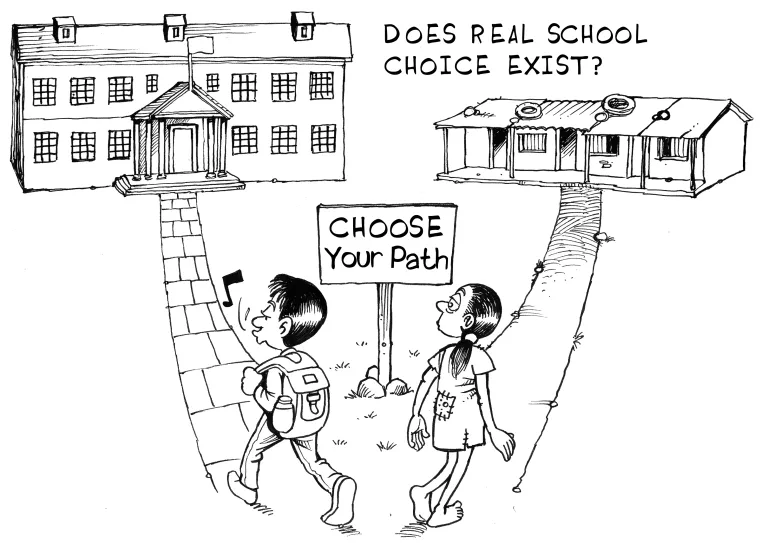
GEM Report(2017). Does School Choice Really Exist? [Cartoon] https://world-education-blog.org/2017/11/03/does-school-choice-really-exist/
As we know, public schools in the United States are largely controlled and funded by federal, state, and local governments. Since public education is managed by the government, the public school system is considered a form of socialism. The federal government is supposed to provide equal education opportunities and protect the rights of students. State and local governments are supposed to provide curriculum standards along with other things such as overseeing school boards. Along with these things, all three forms of government provide funding. With this being said, is government involvement in the public school system really necessary? Is there another way for public education to function?
In “The Law”, Frederic Bastiat, the author of this essay, mentions how he believes that government should only focus on protecting life, liberty, and property for its citizens. He argues that anything outside of this is considered “legal plunder”. Plunder, itself, can be broken down into two categories, being illegal and legal. Illegal plunder is something like theft whereas legal plunder is more complex. If the law takes something from another person, for example, and gives it to another, that is a form of legal plunder. Bastiat believes that public schools are an example of legal plunder. Ultimately, he believes that the government should not have a hand in how schools are regulated and, instead, they should stick to the aforementioned aspects of life, liberty, and property. I wanted to comment that when looking at “The Law”, it is interesting to see that even in Frederic Bastiat’s time (around 1850) socialist’s view on non-socialists was about the same as it is today. He states, “We disapprove of state education…socialists say that we are opposed to any education”. In reality, non-socialists (generally) only wish that the government would not regulate such things.
In this essay, Bastiat brought up some good points about how far government involvement should go. As previously mentioned, the government’s participation in the public school system is, generally, to provide assistance for American education. However, how much is it actually helping? Personally, I have had firsthand experience with rural public-school settings where the majority of my peers were of a lower-class bracket. Most were forced to attend the school closest to them or, if they had a ride, they could drive 30 minutes or more to another public school. Funding was typically not enough. Often, textbooks would be far behind the standard curriculum, qualified teachers would be few and far between, and thus the quality of education was not up to standard. I feel it is important to note that not only was private school not an option because of financial reasons, but it was also not an option because there wasn’t one within 100 miles. Upon graduating from a rural public school, I felt behind compared to many of my university peers. Therefore, I don’t think that the government provides equal educational opportunities to all children. Families with lower socio-economic statuses are typically limited to where their children can get an education.
The government promises equal opportunity and education, though in my case, and for many other individuals, that is not always so. Even by providing curriculum requirements, they are usually setting the bar too high and even, for example, subjecting third graders to standardized testing (which many argue is not fair since it may not be a good assessment of their full potential at such a young age). Since the government has proven time and time again that it cannot fulfill these promises completely, how might public education be regulated? There are already other options for education that don’t have as much involvement from the government such as homeschooling, private schools, and charter schools. But alas, each of these options still has a form of government regulation or funding involved. In a more capitalistic version of school, it wouldn’t be the government that decides the curriculum and provides funding but organizations and communities instead. The effects of this kind of education though, are uncertain and unknown to me.
In conclusion, the government is currently involved in the public school system by providing funding, equal opportunities, and curriculum standards among other things, though the idea of equal educational opportunities is stretched, and the curriculum standards can be harsh. There are other options for childhood education such as homeschooling and private schooling though many citizens don’t have these as an option, and even still, the government has some involvement. For the public-school systems to not be considered “legal plunder”, they would need to make a switch towards capitalism which would take many years to complete and much persuasion.
Works Cited
Meany, P. (2021, May 12). An Introduction to Frédéric Bastiat’s The Law. Libertarianism.org. https://www.libertarianism.org/articles/introduction-frederic-bastiats-law
Streitel, K. (2024, May 3). Bastiat Reminds Us That Education Can Exist-and Prosper-Without Government Schools. Foundation for Economic Education. https://fee.org/articles/bastiat-reminds-us-that-education-can-exist-and-prosper-without-government-schools/